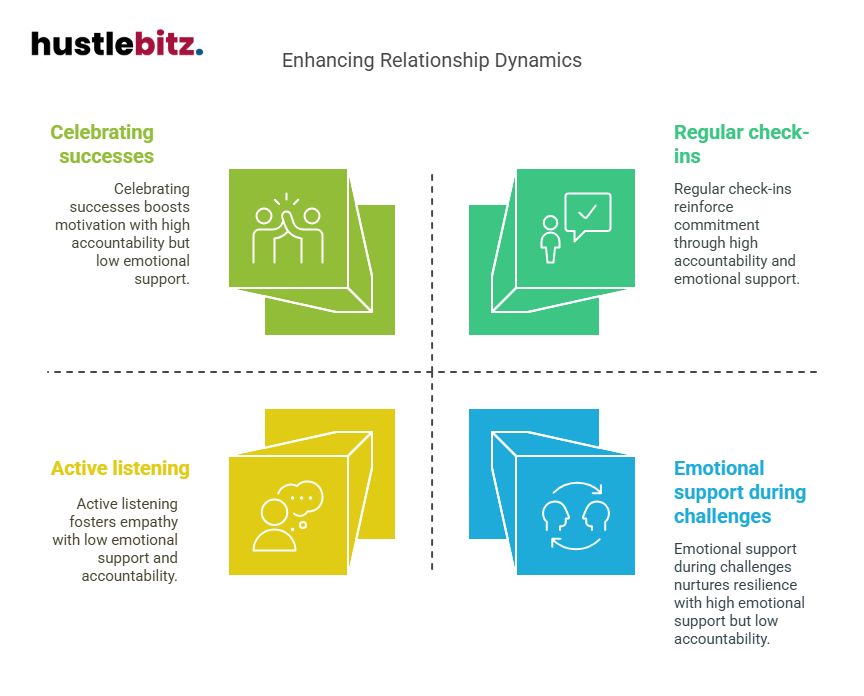Motivation within relationships is essential as partners foster each other’s ambitions and personal growth. This mutually supportive dynamic enhances emotional bonds through shared goals and constructive feedback. Active listening and open communication are vital in promoting understanding and trust. By celebrating each other’s successes, partners can reinforce their commitment to mutual aspirations. Moreover, creating accountability systems strengthens dedication, while providing emotional support helps navigate challenges together. Ultimately, fostering individual growth benefits the relationship, ensuring both partners thrive. Exploring these aspects further can reveal additional strategies to enhance your partnership’s motivation and drive.
Key Takeaways
- Mutual encouragement and shared goals enhance emotional bonds and facilitate personal aspirations in relationships.
- Active listening and effective communication strategies foster empathy and understanding between partners.
- Celebrating each other’s successes boosts motivation and strengthens trust in the relationship.
- Creating accountability systems, like regular check-ins, reinforces commitment to shared ambitions.
- Offering emotional support during challenges nurtures resilience and deepens the emotional connection.

Understanding Mutual Motivation

Mutual motivation in relationships is consistently characterized by a reciprocal exchange of encouragement and support, fostering an environment where both individuals can thrive. This dynamic not only enhances the emotional bond between partners but also facilitates the pursuit of personal aspirations. Understanding the nuances of mutual motivation requires a deep dive into the relationship dynamics that underlie successful partnerships.
At the heart of mutual motivation lies the principle of reciprocal encouragement. When partners actively engage in uplifting each other, they create an atmosphere that values individual dreams and ambitions. This collaborative success is achieved through effective motivation techniques—such as setting shared goals, providing constructive feedback, and celebrating milestones together. These strategies not only reinforce the commitment to one another but also serve as catalysts for personal growth.
Furthermore, mutual motivation empowers partners to recognize and articulate their aspirations openly. When individuals feel safe to express their desires, it nurtures an intimate connection that can propel both partners toward their goals. This transparency allows for a deeper understanding of each other’s motivations, fostering empathy and collaboration in the process.
Benefits of Supporting Each Other

Supporting each other in a relationship not only strengthens the emotional bond between partners but also significantly enhances individual well-being and personal growth. When partners actively support one another, they foster a nurturing environment where both can thrive. This reciprocal encouragement creates a dynamic that enhances relationship dynamics, allowing each person to pursue their passions and aspirations with confidence.
The benefits of supporting each other are profound and multifaceted, including:
- Enhanced emotional intimacy: Sharing experiences while pursuing goals deepens the connection between partners.
- Positive reinforcement: Celebrating each other’s successes instills a sense of accomplishment and motivates further efforts.
- Improved conflict resolution: When partners back one another, it becomes easier to navigate challenges, as they approach conflicts united and focused on solutions.
- Trust building: Consistent support cultivates trust, making it easier to share vulnerabilities and dreams.
As partners engage in this mutual support, they create a tapestry of shared experiences that enrich their journey together. The trust built through these supportive actions not only empowers both individuals but also strengthens the foundation of the relationship itself.
Ultimately, the act of supporting one another fosters a bond that is resilient, allowing partners to face life’s challenges together while inspiring each other to reach new heights. In such an environment, both individuals flourish, creating a lasting legacy of love and motivation that transcends the ordinary.
Effective Communication Strategies
Effective communication strategies are essential for fostering understanding and connection in relationships, enabling partners to express their needs and feelings openly.
One of the cornerstones of effective communication is active listening, where partners engage fully with each other’s words, demonstrating genuine interest and empathy. This approach not only enhances emotional intimacy but also establishes a safe space for vulnerability.
Incorporating feedback loops into conversations can further enhance understanding. By paraphrasing or summarizing what the other person has said, partners can ensure clarity and demonstrate that they value each other’s perspectives. This practice also aids in conflict resolution, as it allows both parties to address misunderstandings before they escalate.
Nonverbal cues play a significant role in communication as well. Body language, eye contact, and facial expressions can convey emotions that words sometimes fail to express. Being attuned to these nonverbal signals can deepen partners’ emotional connection and facilitate more meaningful discussions.
Moreover, employing validation techniques is crucial in affirming each other’s feelings. Acknowledging and validating emotions can reinforce trust and foster a sense of being understood, ultimately strengthening the bond between partners.
Setting Shared Goals Together
Establishing shared goals within a relationship fosters collaboration and strengthens the partnership by aligning both individuals’ aspirations and efforts.
When partners engage in goal alignment, they create a foundation for deeper intimacy and understanding, enabling them to navigate their journey together with purpose.
Collaborative planning not only enhances individual motivation but also enriches the bond between partners as they work toward common objectives.
To effectively set shared goals, consider the following elements:
- Vision Crafting: Articulate a collective vision that resonates with both partners, ensuring it reflects shared values and dreams.
- Mutual Encouragement: Foster an environment where each partner feels supported and inspired to pursue their aspirations, celebrating achievements along the way.
- Open Dialogue: Maintain transparent communication about desires and concerns, allowing for adjustments and refinements in the shared goals.
- Celebrating Milestones: Recognize and celebrate small victories, reinforcing the commitment to the larger vision and enhancing emotional connection.
Creating Accountability Systems

How can partners create accountability systems that enhance their commitment to shared goals and foster mutual growth?
The establishment of accountability systems is pivotal in nurturing a supportive environment where both partners feel encouraged to pursue their aspirations. One effective method is to designate each other as accountability buddies. This role entails regularly checking in on each other’s progress, offering constructive feedback, and celebrating milestones together. By doing so, partners create a bond that reinforces their dedication to shared ambitions.
Tracking progress is essential in this journey. Utilizing journals or digital tools can help both partners visualize their advancements, making it easier to identify achievements and areas needing focus. Setting reminders serves as a gentle nudge, ensuring that neither partner loses sight of their goals amidst life’s daily distractions.
Moreover, it is important to cultivate a mindset geared towards overcoming obstacles. When challenges arise, partners should approach them collaboratively, utilizing their accountability system to brainstorm solutions and maintain motivation. This shared problem-solving experience not only strengthens their connection but also builds resilience in the face of difficulties.
Offering Emotional Support

Offering emotional support is essential in fostering a nurturing environment where partners can openly express their feelings and vulnerabilities. This strengthens their bond and promotes overall relationship satisfaction.
This support not only enhances emotional resilience but also serves as a foundation for trust building, allowing partners to navigate life’s challenges together.
To effectively offer emotional support, consider the following key elements:
- Empathetic Listening: Attentively hearing your partner’s concerns fosters an atmosphere of understanding and validation.
- Encouraging Open Dialogue: Creating a safe space for honest discussions helps in addressing feelings and thoughts without fear of judgment.
- Providing Comfort During Stress: Being there for your partner during times of stress management enhances their ability to cope and reassures them of your unwavering presence.
- Facilitating Conflict Resolution: Collaboratively addressing disagreements promotes a sense of partnership and reinforces the bond you share.
Emotional support acts as a balm for the inevitable strains that arise in relationships. By actively engaging in empathetic listening and encouraging open dialogue, partners can better understand one another’s emotional landscapes.
This understanding not only aids in conflict resolution but also nurtures a deeper intimacy, allowing couples to thrive amid the complexities of life.
Ultimately, the strength of a relationship is often reflected in the emotional support partners provide, creating a resilient foundation that withstands the test of time.
Fostering Individual Growth

Building on the emotional support provided in relationships, fostering individual growth is vital for both partners to thrive and develop their unique identities within the partnership. Encouraging a growth mindset enables each partner to pursue personal aspirations while embarking on self-discovery journeys. This process not only enhances individual identity but also enriches the relationship.
Partners should actively support one another in overcoming obstacles, recognizing that challenges are often stepping stones to growth. By creating a safe space for vulnerability, couples can share their struggles and triumphs, fostering deeper intimacy and connection. Celebrating achievements, no matter how small, reinforces the bond between partners and encourages continued progress.
The following table illustrates key components essential for fostering individual growth within a relationship:
| Component | Description | Impact on Relationship |
| Personal Aspirations | Individual goals that drive motivation | Enhances respect for each other’s dreams |
| Growth Mindset | Belief in the ability to develop skills and abilities | Fosters resilience and adaptability |
| Self-Discovery Journeys | Individual exploration of interests and values | Strengthens self-awareness and connection |
| Overcoming Obstacles | Support during difficult times | Builds trust and partnership |
| Celebrating Achievements | Acknowledging milestones and successes | Reinforces positivity and shared joy |
Through this nurturing approach, couples can create a dynamic environment where both partners flourish, resulting in a more profound and fulfilling relationship.
Final Thoughts
Motivation in relationships is a powerful force that not only strengthens the emotional bond between partners but also fosters personal growth and shared success. By actively supporting each other’s goals, practicing open communication, and offering emotional support, couples create a nurturing environment that encourages mutual development. Whether through setting shared goals, creating accountability systems, or celebrating each other’s achievements, the foundation of motivation within a relationship thrives on trust, empathy, and collaboration. Ultimately, this dynamic ensures that both partners continue to grow individually and together, enhancing the strength and resilience of their relationship.




